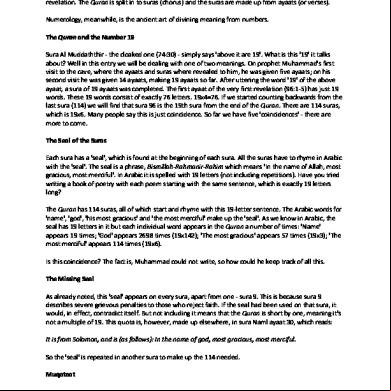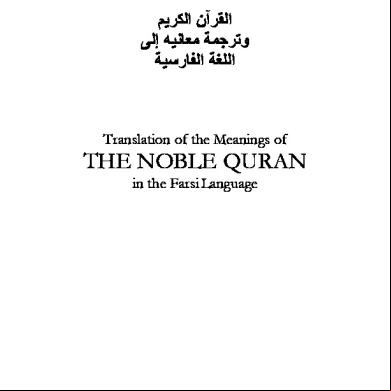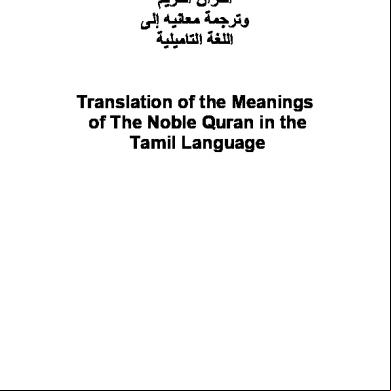Compilation Of The Holy Quran 145c5d
This document was ed by and they confirmed that they have the permission to share it. If you are author or own the copyright of this book, please report to us by using this report form. Report 2z6p3t
Overview 5o1f4z
& View Compilation Of The Holy Quran as PDF for free.
More details 6z3438
- Words: 781
- Pages: 4
COMPILATION OF THE HOLY QURAN/SCRIBE OF THE HOLY QURAN The history of the Quran refers to the revelation of the Quran to Islamic prophet Muhammad, and its subsequent compilation. It spans several decades and forms an important part of early Islamic history. Muslim s say it began in the year 610 when Gabriel appeared to Muhammad in the cave Hira near Mecca, reciting to him the first verses of the sura Iqra thus beginning the revelation of the Quran.
Throughout his life, Muhammad continued to have revelations until before his death in 632. Muslim and non-Muslim scholars disagree on whether Muhammad compiled the Quran during his lifetime or if this task began with the first caliph Abu Bakr . Once the Quran was compiled, due to the unanimity of the sources, Muslims agree that the Quran we see today was canonized by Uthman
Upon the canonization, Uthman ordered the burning of all personal copies of the Quran. The copy of the Quran kept with Muhammad's wife Hafsa was accepted. Until then, several copies of the Quran were available in different regions of Arabia with some grammatical errors, so Uthman's order allowed only one version of the Quran to exist to prevent any misinterpretation of Quranic text or word of God (Allah).
Even though Uthman canonized the written Quran during his reign in 653-656, small diacritical variations still remained in the written Quran, [this is not a neutral statement since there are differences in words and phrases in old manuscripts like the Samarkand] which can be seen in the early manuscripts of the Umayyad and Abbasid Dynasties.
Due to varying historical documents, controversy is seen amongst some scholars as to whether the Uthmanic codex we have today is authentic and complete. Most Muslim scholars believe the Uthmanic Quran to be the authentic revelation to Muhammad, while some nonMuslim scholars believe verses were removed and other codices of the Quran are more absolute. Nevertheless, even according to secular scholars what was done to the Quran in the process seems to have been extremely conservative and the content was formed in a mechanical fashion as to avoid redactional bias .
Due to the fact that the Quran was revealed in disted verses and chapters, a point came when it needed to be gathered into a coherent whole text. There are disagreements among both Muslim and nonMuslim scholars as to when the Quran was compiled. Some believe Muhammad compiled it before he died, while others believe it was collected by either Ali ibn Abu Talib or Abu Bakr.
FIRST COPY OF COMPLIED HOLY QURAN KNOWN AS A MUSHAF-E-USMANI The project compilation of the Holy Quran. Umar suggested to Abu Bakr that all the revelations of the Holy Quran should be collected, and compiled in the form of a book. Abu Bakr was in the first instance reluctant to undertake the project for the reason that as the Holy Prophet had not felt the necessity of such compilation; it did not behoove him, as the successor to the Holy Prophet, to take any initiative in the matter. Umar, however, continued to press his proposal. He argued that as during the life-time of the Holy Prophet, the process of revelation was continuous, there was no occasion for stringing the various verses in the form of a compilation, but after the death of the Holy Prophet, and the cessation of the process of revelation, the position had changed, and it devolved on the successor of the Holy Prophet to suitably conserve the Holy Quran lest it might be lost or corrupted in the course of time. The argument appealed to Abu Bakr, and on further consideration, he agreed to undertake the project. Zaid bin Thabit. Zaid bin Thabit was summoned by Abu Bakr and entrusted with the task of collecting all the verses, and compiling them in a book form. Zaid's immediate reaction to proposal was that if he had been asked to remove a mountain from its original site, and place it elsewhere, he would have considered it easier than the task of compiling the Holy Quran. Abu Bakr appreciated the difficulties of Zaid bin Thabit, but observed that the word of God had to be preserved for the guidance of the coming generations, and the task had to be undertaken, whatever the odds. Zaid accepted the commission, and after hard labor and in consultation with the various companions of the Holy Prophet produced a compilation. Abu Bakr was himself a Hafiz. He, therefore, checked the compilation of Zaid very minutely, and after making whatever changes were necessary, he kept the finally approved copy in his
personal custody. He gave the sacred compilation the name of "Mushaf".
Throughout his life, Muhammad continued to have revelations until before his death in 632. Muslim and non-Muslim scholars disagree on whether Muhammad compiled the Quran during his lifetime or if this task began with the first caliph Abu Bakr . Once the Quran was compiled, due to the unanimity of the sources, Muslims agree that the Quran we see today was canonized by Uthman
Upon the canonization, Uthman ordered the burning of all personal copies of the Quran. The copy of the Quran kept with Muhammad's wife Hafsa was accepted. Until then, several copies of the Quran were available in different regions of Arabia with some grammatical errors, so Uthman's order allowed only one version of the Quran to exist to prevent any misinterpretation of Quranic text or word of God (Allah).
Even though Uthman canonized the written Quran during his reign in 653-656, small diacritical variations still remained in the written Quran, [this is not a neutral statement since there are differences in words and phrases in old manuscripts like the Samarkand] which can be seen in the early manuscripts of the Umayyad and Abbasid Dynasties.
Due to varying historical documents, controversy is seen amongst some scholars as to whether the Uthmanic codex we have today is authentic and complete. Most Muslim scholars believe the Uthmanic Quran to be the authentic revelation to Muhammad, while some nonMuslim scholars believe verses were removed and other codices of the Quran are more absolute. Nevertheless, even according to secular scholars what was done to the Quran in the process seems to have been extremely conservative and the content was formed in a mechanical fashion as to avoid redactional bias .
Due to the fact that the Quran was revealed in disted verses and chapters, a point came when it needed to be gathered into a coherent whole text. There are disagreements among both Muslim and nonMuslim scholars as to when the Quran was compiled. Some believe Muhammad compiled it before he died, while others believe it was collected by either Ali ibn Abu Talib or Abu Bakr.
FIRST COPY OF COMPLIED HOLY QURAN KNOWN AS A MUSHAF-E-USMANI The project compilation of the Holy Quran. Umar suggested to Abu Bakr that all the revelations of the Holy Quran should be collected, and compiled in the form of a book. Abu Bakr was in the first instance reluctant to undertake the project for the reason that as the Holy Prophet had not felt the necessity of such compilation; it did not behoove him, as the successor to the Holy Prophet, to take any initiative in the matter. Umar, however, continued to press his proposal. He argued that as during the life-time of the Holy Prophet, the process of revelation was continuous, there was no occasion for stringing the various verses in the form of a compilation, but after the death of the Holy Prophet, and the cessation of the process of revelation, the position had changed, and it devolved on the successor of the Holy Prophet to suitably conserve the Holy Quran lest it might be lost or corrupted in the course of time. The argument appealed to Abu Bakr, and on further consideration, he agreed to undertake the project. Zaid bin Thabit. Zaid bin Thabit was summoned by Abu Bakr and entrusted with the task of collecting all the verses, and compiling them in a book form. Zaid's immediate reaction to proposal was that if he had been asked to remove a mountain from its original site, and place it elsewhere, he would have considered it easier than the task of compiling the Holy Quran. Abu Bakr appreciated the difficulties of Zaid bin Thabit, but observed that the word of God had to be preserved for the guidance of the coming generations, and the task had to be undertaken, whatever the odds. Zaid accepted the commission, and after hard labor and in consultation with the various companions of the Holy Prophet produced a compilation. Abu Bakr was himself a Hafiz. He, therefore, checked the compilation of Zaid very minutely, and after making whatever changes were necessary, he kept the finally approved copy in his
personal custody. He gave the sacred compilation the name of "Mushaf".





